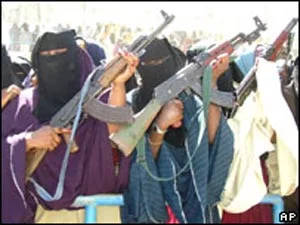 By MUTUMA MATHIU
By MUTUMA MATHIUI confess I have been writing saucy war headlines. We journalists and our soulmates in certain sections of society, mainly MPs, talking heads and other armchair jockeys, are in the grip of a bloodlust which started with Migingo and followed the Tana westwards.
We probably need to come down a little from our armchair balloons and take a second look at this war proposition. There are two issues. One, is war itself; the second is the so-called enemy, the machinegun-toting, pickup riding, suicide attack-threatening, gentlemen of al-Shabaab.
War. It’s a nasty, expensive business. One soldier told me that armies don’t go to war (they just do the shooting), countries do. When you go to war, you throw everything into it. You open your treasury to the military and you close it to everything else. No CDF, no roads, no digital villages, no undersea cables. Just bullets and MREs.
I was surprised when a Saudi I recently met in London told me his wealthy kingdom is basically broke after Gulf War One. One of the biggest beefs in Saudi Arabia, he told me, is that few Saudis can afford to live in their own houses.
The government has no money to build them houses or give them soft loans because all the money went into paying for that war. So war is expensive even for people who shower in crude. Then of course many, many of your people are killed. In a sense, when a country goes to a serious war, it gambles its very survival. It is not the kind of thing you want to do too often.
And (this is the enemy part of the argument) for what? To teach 2,000 Somali tribesmen a lesson? Would they even get it?
Conventional military reasoning is that al-Shabaab is not an army; it is a group of thugs, a militia which is guided by no ideology, no coherent policy other than a misreading of religion, bravado and the commercial interests of the warlords who pay, train and arm them.
It’s not capable of waging war, not in the conventional sense. It is only capable of committing criminal acts, including serious ones such as terrorism. In that sense, al-Shabaab is a problem to be dealt with by the Rapid Response Unit of the Administration Police, rather than the 78 Tank Battalion.
The Somali state is in an unprecedented condition of collapse. Without a government for 28 years, it is not just law and order which no longer exists. It is a society without organised healthcare, education system or infrastructure. A military victory over al-Shabaab will not solve the problem of state collapse.
Those are the sane, moderate arguments, the kind that you are likely to get from the Kenyan military establishment. My own perspective is different, militant, impatient, and quite likely hotheaded. But, having been born and bred where I was born and bred, can anyone really blame me?
By any rational definition, Somalia operates and functions as an enemy country. It hurts Kenya’s vital interests, including its economy and security. It hurts our pockets through piracy and smuggling (one of the biggest criminal operations in Africa) and the terrorism it breeds.
We spend billions of shillings watching Somalia and protecting ourselves against it, not to mention the hundreds of thousands of illegal guns it pumps into our streets, resulting in murder and mayhem. It’s extremists are radicalising some Kenyans and possibly turning them against their own country. By allying itself with our enemy, al-Qaeda, one can argue that Somalia has chosen its side.
The war in Somalia, many people will agree, is likely to lay the foundation for an even bigger terrorist network in Kenya. Some young people are being indoctrinated in funny institutions, then sneaked across the border where they are trained and used as cannon fodder by warlords. They are told they are going to fight a jihad.
When they come back, scarred by war, their brains addled by al-Qaeda propaganda, they pose a danger to their communities, their mosques and their country. Many are, of course, those who do not return.
The picture is, of course, a lot more complex. By some estimates, 90 per cent of Somalis have no time for al-Shabaab. They may be chaotic and lawless, but they are moderates. This silent and powerless majority is as much of a victim as the man who is shot in the streets of Nairobi with a gun smuggled from Somalia.
But that is the nature of these things. Not every German in 1938 was Nazi. That didn’t stop the German nation from going to war, nor did it stop the allies from banging its head.
The use of an army is to fight and to deter. I fear that the Kenyan forces, because of lying unused for so long, are losing their deterrence factor. Our enemies don’t know what they are capable of and, therefore, don’t fear them.
And, finally, the most controversial of ‘em all: Can our army fight? After decades of abuse by politicians through corrupt procurement, is our military intact, well-supplied and ready? Do we have hard, real men under arms or do we have fat wimps who while away their lives drinking beer, playing darts in the mess and conveniently forgetting that they were hired to fight?
When the village madman stands on your fence and insults your wife, you can do two things. One, you can quite reasonably explain to everyone what they already know, that he is mad. Or you can wait for him at the village path in the dark with your rungu and take out his kneecap. You will be surprised at how, in future, his madness will exclude disrespect to your lady wife.
The thing with village madmen is that they are the world’s greatest escalation experts. They will first insult, then attack your wife. If still nothing happens, they will burn your damn house.



Comments